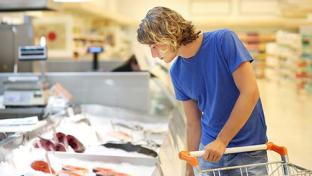Sustainable Seafood Offers a Healthy Body and a Healthy Planet
During a pandemic, people naturally focus on health, not only in regard to a potentially deadly virus, but also when it comes their overall wellness, not to mention that of the earth. That may be a key reason for the current uptick in popularity of seafood, and particularly sustainable products in the category.
“Concerns about wellness and the natural environment have heightened, because people have realized how intricately their health is connected to the health of the planet,” affirmed Kristen Stevens, senior marketing manager USA at the London-based Marine Stewardship Council (MSC), which sets global standards for sustainable fishing. “In just a few months of restrictions and stay-at-home orders, people saw a positive impact on the environment, like cleaner air and water. In addition, people are now asking more questions about where their product is from and if it was sourced responsibly, knowing that their purchases make a direct impact on their health and the environment’s.”
Added Stevens: “We’re seeing an increase in seafood consumption in 2020 for a few reasons – consumers are turning to seafood to try to stay healthy and boost their immune systems, and to reduce their red-meat consumption for both health and environmental reasons. Simultaneously, consumers are hungry for information on seafood sustainability and responding positively to messaging that helps them act on their values. They’re also becoming more discerning, wanting environmental claims to be backed up and have accreditation, to reassure them that they’re making a good purchase decision.”
Sean Wittenberg, co-founder of Sausalito, California-based Safe Catch, a brand of sustainably caught shelf-stable seafood, observed that “this health crisis has catalyzed health-and-wellness awareness – accelerating the movement that has been gradually transforming buying behavior and grocery store formats for the last decade. People are consciously establishing the connection between quality of diet and a healthy immune system, so they are returning to natural and reliable food sources to fortify their bodies. The seafood category has increased in consumer value during COVID, because of the mind and body benefits of lean protein and Omega-3s (DHA/EPA), not to mention the critical vitamin D value. Consumers are naturally finding, through better nutrition, their minds and spirits are benefiting as well.”
According to Wittenberg, Safe Catch’s “core 5-ounce cans of Elite, Ahi or Albacore Tuna, Pink Salmon, and Sardines are in high demand as staples for family salads, sandwiches or main dishes. With strong pull-through, multipacks have become increasingly popular, whether in club stores or online.”
He advised retailers as follows: “Highlight the healthiest options in every category and engage shoppers through recipes to cross promote products. Bundling meal solutions is always a value to consumers, and is especially important as consumers seek to minimize or eliminate in-store shopping time. Shoppers are creating new family favorites through this home-centered period and, once the COVID-19 pandemic is behind us, will carry them forward, similarly to how our parents and grandparents carried their childhood meals through to today. This is an excellent opportunity for retailers to build an even stronger relationship with their guests.”
With "more consumers wanting to know the origins of their food and support the domestic economy and communities," Megan Rider, domestic marketing director at the Juneau-based Alaska Seafood Marketing Institute (ASMI), noted that the organization relies on clear signage and various retail promotions to bring attention to the state's wild, sustainable fresh and frozen seafood.
Retailers small and large have ramped up their sustainable offerings; although this trend predates the onset of COVID-19, it’s likely to benefit from pandemic shoppers’ greater awareness of seafood options at grocery, including items that reflect their deeply held beliefs.
“We only carry fresh and frozen raw seafood that comes from responsible sources as defined by the Monterey Bay Aquarium Seafood Watch program,” said David Sanz, meat and seafood merchandiser at Seattle-based PCC Community Markets, a cooperative with 15 locations. “This means fisheries or aquaculture operations are rated a Green Best Choice, Yellow Good Alternative or are eco-certified to a standard recognized by Seafood Watch. This is in addition to our new PCC Chinook Sourcing Standard. PCC members and shoppers have always demanded quality and sustainable products, and that is especially true with our seafood. This [past] September, we introduced the standard ensuring our stores only offer Chinook salmon sourced to protect Salish Sea Southern Resident Killer Whales’ main food supply and overall Chinook populations.”
“We ... realize that our customers care about the sustainability practices we follow with our seafood,” said Lisa Guinther, seafood category manager at Landover, Md.-based Giant Food, an Ahold Delhaize USA banner operating more than 164 supermarkets in Virginia, Maryland, Delaware and the District of Columbia. “That is why at Giant, we recently partnered with the Ocean Disclosure Project (ODP), a global platform where retailers voluntarily share insight into their sourcing methods to ensure sustainable seafood practices. Giant’s sustainable seafood policy has always ensured that every seafood item sold in stores meets sustainability criteria, but we are now taking it a step further, enlisting ODP to make the original sources of all its own-brand wild-caught seafood transparent and available to the public.”
“There’s an increasing realization among consumers that their everyday shopping habits can create change,” observed MSC’s Stevens. “People realize their purchase is a vote for the future they want to see.”







